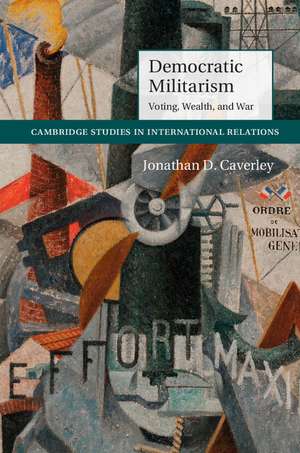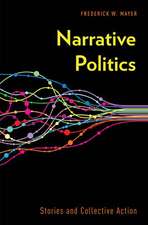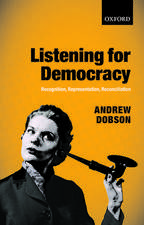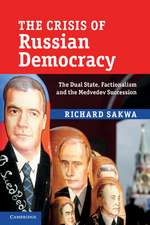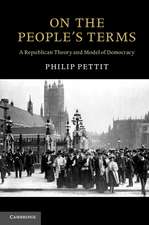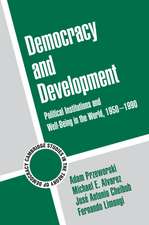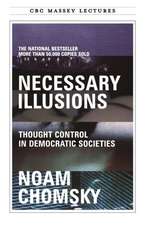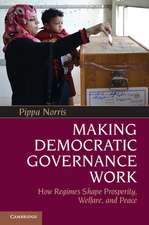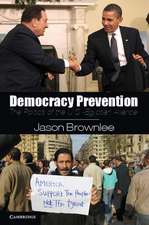Democratic Militarism: Voting, Wealth, and War: Cambridge Studies in International Relations, cartea 131
Autor Jonathan D. Caverleyen Limba Engleză Paperback – 30 apr 2014
| Toate formatele și edițiile | Preț | Express |
|---|---|---|
| Paperback (1) | 254.16 lei 43-57 zile | |
| Cambridge University Press – 30 apr 2014 | 254.16 lei 43-57 zile | |
| Hardback (1) | 665.87 lei 43-57 zile | |
| Cambridge University Press – 30 apr 2014 | 665.87 lei 43-57 zile |
Din seria Cambridge Studies in International Relations
-
 Preț: 200.85 lei
Preț: 200.85 lei -
 Preț: 232.37 lei
Preț: 232.37 lei -
 Preț: 237.58 lei
Preț: 237.58 lei -
 Preț: 198.89 lei
Preț: 198.89 lei -
 Preț: 210.69 lei
Preț: 210.69 lei -
 Preț: 190.01 lei
Preț: 190.01 lei -
 Preț: 200.78 lei
Preț: 200.78 lei - 8%
 Preț: 401.23 lei
Preț: 401.23 lei -
 Preț: 229.56 lei
Preț: 229.56 lei -
 Preț: 265.70 lei
Preț: 265.70 lei -
 Preț: 200.08 lei
Preț: 200.08 lei -
 Preț: 207.81 lei
Preț: 207.81 lei -
 Preț: 158.77 lei
Preț: 158.77 lei -
 Preț: 162.49 lei
Preț: 162.49 lei -
 Preț: 231.47 lei
Preț: 231.47 lei - 11%
 Preț: 584.77 lei
Preț: 584.77 lei -
 Preț: 241.77 lei
Preț: 241.77 lei -
 Preț: 287.87 lei
Preț: 287.87 lei -
 Preț: 209.12 lei
Preț: 209.12 lei -
 Preț: 299.22 lei
Preț: 299.22 lei -
 Preț: 286.13 lei
Preț: 286.13 lei -
 Preț: 287.87 lei
Preț: 287.87 lei - 11%
 Preț: 641.67 lei
Preț: 641.67 lei - 11%
 Preț: 585.78 lei
Preț: 585.78 lei - 14%
 Preț: 843.23 lei
Preț: 843.23 lei -
 Preț: 303.80 lei
Preț: 303.80 lei -
 Preț: 284.78 lei
Preț: 284.78 lei -
 Preț: 279.76 lei
Preț: 279.76 lei -
 Preț: 285.75 lei
Preț: 285.75 lei -
 Preț: 324.24 lei
Preț: 324.24 lei -
 Preț: 290.16 lei
Preț: 290.16 lei -
 Preț: 291.69 lei
Preț: 291.69 lei -
 Preț: 392.52 lei
Preț: 392.52 lei -
 Preț: 315.99 lei
Preț: 315.99 lei
Preț: 254.16 lei
Nou
Puncte Express: 381
Preț estimativ în valută:
48.63€ • 50.91$ • 40.24£
48.63€ • 50.91$ • 40.24£
Carte tipărită la comandă
Livrare economică 07-21 aprilie
Preluare comenzi: 021 569.72.76
Specificații
ISBN-13: 9781107667372
ISBN-10: 1107667372
Pagini: 326
Ilustrații: 26 b/w illus. 1 map 18 tables
Dimensiuni: 152 x 228 x 16 mm
Greutate: 0.52 kg
Ediția:New.
Editura: Cambridge University Press
Colecția Cambridge University Press
Seria Cambridge Studies in International Relations
Locul publicării:New York, United States
ISBN-10: 1107667372
Pagini: 326
Ilustrații: 26 b/w illus. 1 map 18 tables
Dimensiuni: 152 x 228 x 16 mm
Greutate: 0.52 kg
Ediția:New.
Editura: Cambridge University Press
Colecția Cambridge University Press
Seria Cambridge Studies in International Relations
Locul publicării:New York, United States
Cuprins
1. Introduction: sources of democratic military aggression; 2. Cost distribution and aggressive grand strategy; 3. Analyses of public opinion; 4. Analyses of arming and war; 5. British electoral reform and imperial overstretch; 6. Vietnam and the American way of small war; 7. Becoming a normal democracy: Israel; 8. Conclusion: strategy wears a dollar sign.
Recenzii
'Jonathan Caverley's Democratic Militarism links economics, domestic politics, and international security in a fresh and thought-provoking way. This book deserves to be pondered by both scholars and policy-makers alike.' Thomas G. Mahnken, Jerome Levy Chair of Economic Geography and National Security, US Naval War College
'Caverley gives us a provocative explanation of why rich democracies with highly unequal income distribution may have costly capital-intensive military machines and wage war often. Observers of US politics and policy have much to consider here.' Bruce Russett, Dean Acheson Research Professor of International Relations, Yale University
'Caverley has produced what will come to be regarded as one of the best IR books of the past decade. Since the end of the Cold War there have been very few books that advance truly new ideas. He has built a new theory linking states' domestic political economy to their relative bellicosity, strategic doctrine, and armaments bias. Caverley's historical illustrations guide the reader through a wholly novel way of thinking about the nature of domestic and international politics.' Allan C. Stam, Gerald R. Ford School of Public Policy, University of Michigan
'Democratic Militarism may transform how we think about democracy, wealth and war. Caverley builds a bold theory from the ground up, provides substantial initial empirical support for it, and applies it to some of the most important and enduring questions of our time. I firmly expect that this will come to be seen as one of the most influential books in international security produced in years.' William C. Wohlforth, Daniel Webster Professor of Government, Dartmouth College
'Caverley gives us a provocative explanation of why rich democracies with highly unequal income distribution may have costly capital-intensive military machines and wage war often. Observers of US politics and policy have much to consider here.' Bruce Russett, Dean Acheson Research Professor of International Relations, Yale University
'Caverley has produced what will come to be regarded as one of the best IR books of the past decade. Since the end of the Cold War there have been very few books that advance truly new ideas. He has built a new theory linking states' domestic political economy to their relative bellicosity, strategic doctrine, and armaments bias. Caverley's historical illustrations guide the reader through a wholly novel way of thinking about the nature of domestic and international politics.' Allan C. Stam, Gerald R. Ford School of Public Policy, University of Michigan
'Democratic Militarism may transform how we think about democracy, wealth and war. Caverley builds a bold theory from the ground up, provides substantial initial empirical support for it, and applies it to some of the most important and enduring questions of our time. I firmly expect that this will come to be seen as one of the most influential books in international security produced in years.' William C. Wohlforth, Daniel Webster Professor of Government, Dartmouth College
Notă biografică
Descriere
Examines the political and economic circumstances which lead democracies to build up their militaries and involve themselves in armed conflict.
